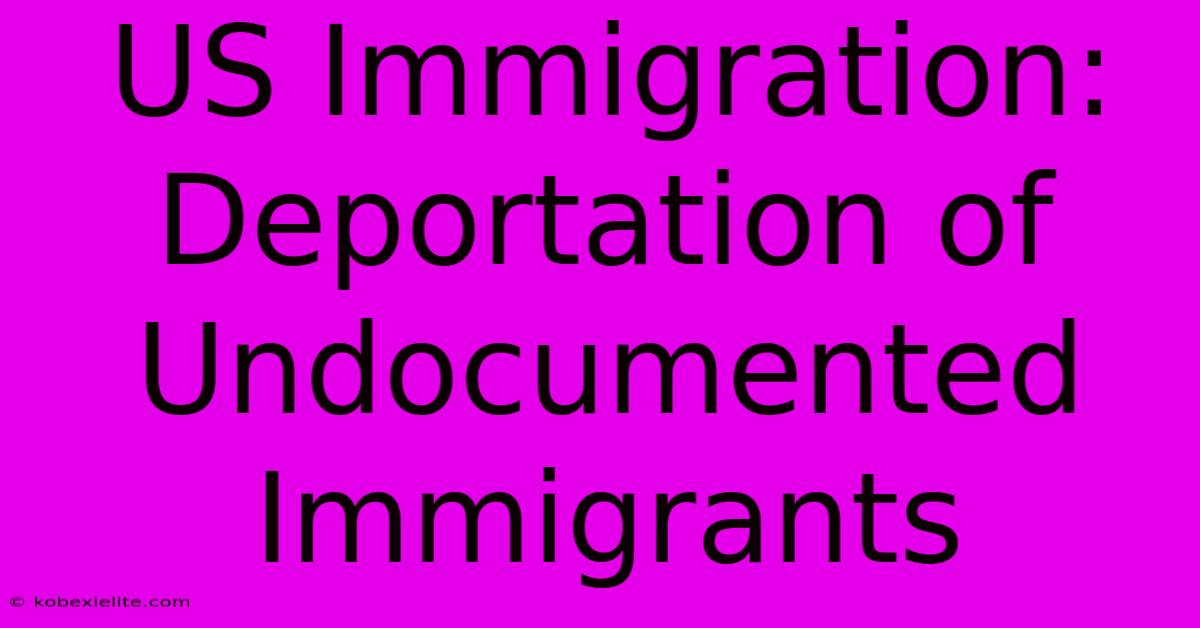US Immigration: Deportation Of Undocumented Immigrants

Discover more detailed and exciting information on our website. Click the link below to start your adventure: Visit Best Website mr.cleine.com. Don't miss out!
Table of Contents
US Immigration: Deportation of Undocumented Immigrants
The deportation of undocumented immigrants in the United States is a complex and highly debated issue, sparking passionate arguments on both sides. Understanding the process, the laws involved, and the human impact is crucial for navigating this multifaceted topic. This article aims to provide a comprehensive overview of the deportation process in the US, exploring its legal framework, challenges, and the ongoing national conversation surrounding it.
The Legal Framework of Deportation
US immigration law grants the government broad authority to remove individuals who are deemed to be in violation of immigration statutes. This authority stems primarily from the Immigration and Nationality Act (INA). The INA outlines various grounds for deportation, including:
- Entry without inspection: Entering the US without going through official immigration checkpoints.
- Visa violations: Overstaying a visa or violating the terms of a visa.
- Criminal convictions: Certain criminal offenses can trigger deportation proceedings, even if the individual has lived in the US for many years. The severity of the crime plays a significant role.
- Fraud or misrepresentation: Providing false information during the immigration process.
- Public charge: Individuals who are likely to become dependent on public assistance may be deemed deportable.
The Deportation Process: A Step-by-Step Overview
The deportation process typically involves several stages:
-
Initial Encounter: This often involves contact with Immigration and Customs Enforcement (ICE) agents, potentially during a traffic stop, workplace raid, or other interaction.
-
Issuance of a Notice to Appear (NTA): The NTA is a formal document outlining the charges against the individual and scheduling an immigration court hearing.
-
Immigration Court Hearing: The individual has the right to legal representation and can present evidence to fight deportation. This can involve demonstrating hardship to themselves or their family, or arguing that they are eligible for relief from deportation (e.g., asylum, cancellation of removal).
-
Decision by the Immigration Judge: The judge will review the evidence and render a decision. If the judge orders deportation, the individual can appeal the decision.
-
Deportation: If the deportation order is upheld, ICE will carry out the removal of the individual from the United States.
Challenges and Criticisms of the Deportation System
The US deportation system faces numerous criticisms, including:
-
Due Process Concerns: Concerns exist regarding the fairness and efficiency of the immigration court system, including long wait times, limited access to legal representation, and potential for bias.
-
Humanitarian Concerns: Critics argue that the deportation of long-term residents, families with US citizen children, and individuals with strong community ties is inhumane and disrupts families and communities.
-
Enforcement Priorities: The shifting priorities of ICE regarding who to deport have raised concerns about fairness and transparency.
-
Cost: The cost of deporting individuals is substantial, placing a significant burden on taxpayers.
The Ongoing National Conversation
The debate surrounding immigration and deportation remains highly polarized. Advocates for stricter enforcement emphasize national security and the rule of law, while proponents of more lenient policies emphasize humanitarian concerns, economic contributions of immigrants, and the separation of families. The ongoing discussion involves exploring alternative approaches such as comprehensive immigration reform, increased border security, and pathways to legalization for undocumented immigrants.
Conclusion
The deportation of undocumented immigrants in the US is a complex issue with significant legal, social, and economic implications. Understanding the legal framework, the challenges of the system, and the ongoing national conversation is crucial for informed engagement with this critical topic. Continued dialogue and a commitment to finding humane and effective solutions are necessary to address this pressing issue.

Thank you for visiting our website wich cover about US Immigration: Deportation Of Undocumented Immigrants. We hope the information provided has been useful to you. Feel free to contact us if you have any questions or need further assistance. See you next time and dont miss to bookmark.
Featured Posts
-
Mavericks Durant Trade Tracker
Feb 06, 2025
-
Shop Holly Willoughbys Celebrity Bear Hunt Looks
Feb 06, 2025
-
Perth Southeast Bushfires Live Updates
Feb 06, 2025
-
Former Afl Player Adam Hunter Dies
Feb 06, 2025
-
Newcastle V Arsenal As It Happened
Feb 06, 2025
